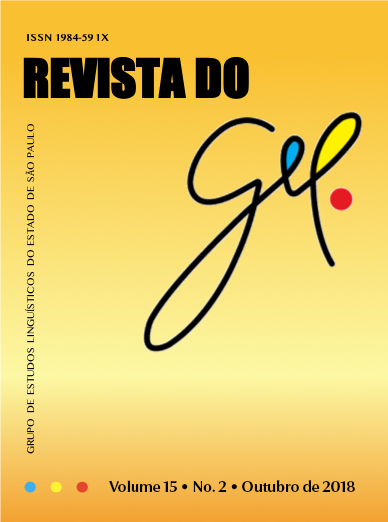The grammatical gender in the gay speech and its (multi)functionality
DOI:
https://doi.org/10.21165/gel.v15i2.2055Keywords:
Grammatical gender. Predication. Gay speech. Linguistic functionalism.Abstract
This study approaches the variation between the use of adjectives in agreement with the masculine and feminine gender in predications made by gay men, academics of the Communication and Expression Center of the Federal University of Santa Catarina, from the perspective of the North American functionalism of Talmy Givón. Oral interviews with six individuals of this community were carried out separately, and the analysis of the collected data showed that these individuals make varied use of both grammatical genders in their predicative constructions, being able to produce, for example, sentences such as “estou cansada (I am tired with feminine gender agreement)” and “estou cansado (I am tired with masculine gender agreement)”, referring to themselves. The interviews were divided into thematic blocks and the collection instrument sought first to verify if the individuals would use the female gender during the interview, through questions that required a predicative response and, secondly, to inquire directly about the phenomenon. According to the data, external factors such as (i) the degree of formality of the communicative situation and (ii) the degree of intimacy with the interlocutor can give condition or restrict both uses, favoring the masculine form in situations of greater formality and less intimacy. Regarding the functionality of each variant, three functions performed by the feminine form, seen thus as multifunctional, were identified: (i) representational semantic function, the use that is shared with male predication; (ii) superlative functions (+ and ++); and (iii) interactive functions (to express irony, joke, and intimacy).
Downloads
Downloads
Published
How to Cite
Issue
Section
License
Esta revista oferece acesso livre imediato ao seu conteúdo, seguindo o princípio de que disponibilizar gratuitamente o conhecimento científico ao público proporciona maior democratização mundial do conhecimento.
A REVISTA DO GEL não cobra taxa de submissão ou de editoração de artigos (articles processing charges – APC).
Os critérios gerais de direitos autorais da REVISTA DO GEL estão dispostos no termo de direitos autorais que cada autor aceita ao submeter seu trabalho no periódico. Como regra geral o periódico utiliza as regras CC BY-NC da Creative Commons (regra disponível em: https://creativecommons.org/licenses/by-nc/4.0/legalcode)



